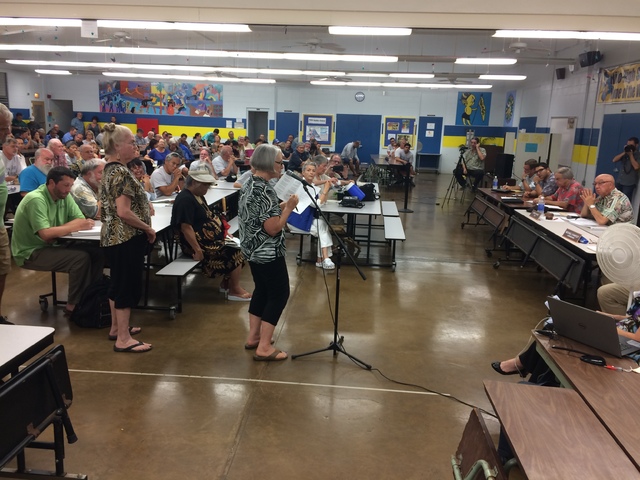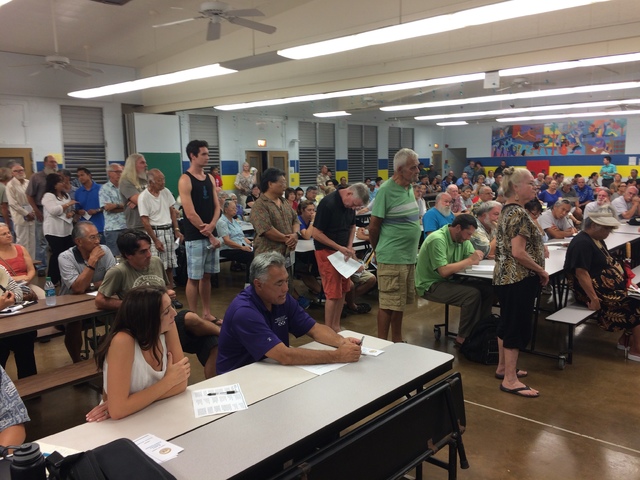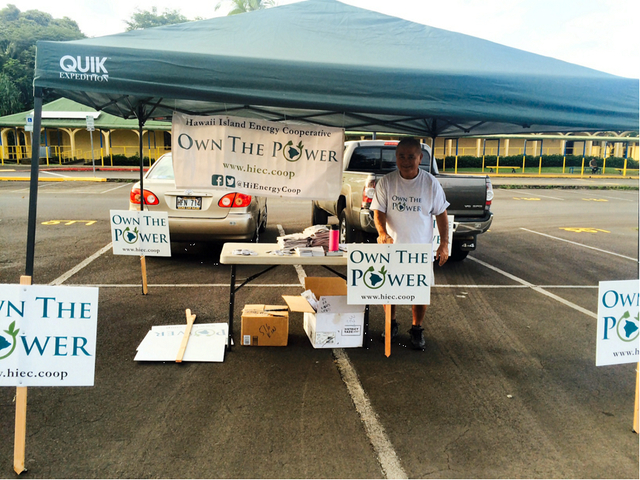Area residents who spoke during a public meeting were almost universally opposed to the pending acquisition of Hawaii Island’s electric utility. ADVERTISING Area residents who spoke during a public meeting were almost universally opposed to the pending acquisition of Hawaii
Area residents who spoke during a public meeting were almost universally opposed to the pending acquisition of Hawaii Island’s electric utility.
Hosted Tuesday evening at Hilo High School, the listening session was one of a series of meetings put on by the state Public Utilities Commission to aid its members as they weigh a proposal by Florida-based NextEra Energy Inc. to assume control of the Hawaiian Electric Industries Inc. utilities throughout the state in a $4.3 billion merger. More than 300 people attended the meeting, with dozens waiting in line to speak to the PUC members.
In addition to voicing their concerns about the possible takeover of the Big Island’s electricity provider, Hawaii Electric Light Co., a majority of speakers simultaneously voiced support for pursuing a ratepayer owned utility similar to the nonprofit Kauai Island Utility Cooperative. Organized by a group of area business and community leaders, the nonprofit Hawaii Island Energy Cooperative showed up in force Tuesday to push for such an option, setting up an information canopy in the parking lot and wearing matching T-shirts and holding signs reading “Own The Power.”
“I’m happy that NextEra came to Hawaii, and I’ll be even happier when they leave,” Cory Hardin told commissioners in his testimony. “I’m happy they came because they have jumpstarted the conversation in Hawaii about the best model of utility ownership and about renewable energy. I hope that conversation will include thorough consideration of public owned utilities and/or co-op utilities. These models would mean local control instead of control by strangers thousands of miles away, they would mean the profits return to the people instead of going to millionaire executives, and it could mean much greater focus on renewable energy.”
Hilo resident Ruth Robison agreed.
“I believe that all parties — I’d like to give them the benefit of the doubt — HECO, NextEra and the Hawaii Island Energy Cooperative, want to accomplish the goals stated by Gov. (David) Ige of becoming completely energy self-sustaining using 100 percent renewable sources by 2045. However, I favor the business model of the not-for-profit energy cooperative for Hawaii Island over the for-profit business model that would continue under the proposed merger. Without needing to include a profit margin in its pricing, an energy cooperative would be able to provide energy to its members at a lower cost.”
Papaikou resident Ken Magnuson told PUC members if their goal was to make a decision based on the best interests of Hawaii residents, they would have to base that decision on lower electric rates.
“Every business person in here, we complain that Hawaii is not friendly. Look at the rates. Look at how many more employees could be hired if rates were lower. The second highest (rates) in the U.S. is half of what we pay here,” he said. “I don’t believe NextEra has a good track record. With solar, they have a terrible track record.”
Hilo financial adviser Gary Kitahata said he was opposed to the merger despite the fact he could financially benefit from the sale.
“I don’t believe that the proposed transaction is in the public interest. And I’m speaking about this as a (Hawaiian Electric Companies) shareholder,” he said. “I voted my shares against the merger, and that’s clearly against my economic interests as a shareholder, but there were a number of things in the proxy statement that I thought were of concern. When I looked at the executive compensation, with the CEO being paid $11.5 million, with the next two executives being paid almost $8 million, those are big numbers. The even bigger number is the amount that J.P. Morgan, as the financial adviser, would get if the merger was approved, which is $30 million.”
He argued that a big corporation working to benefit its shareholders and executives isn’t what Hawaii Island needs when it comes to an electric utility.
“I understand that those numbers are logical in corporate finance, that the whole idea in corporate finance is to maximize shareholder value. I appreciate that. But I think that your question is about the public interest, and as a regulated public utility, the public interest is not being served in this case,” Kitahata said.
Interestingly, despite the overwhelming opposition to the merger among the people who chose to speak Tuesday, many in the audience appeared to still be undecided about the issue. Only a little more than half of the attendees at the meeting stood up to show their opposition when asked to do so by one of the testifiers.
Meanwhile, Dean Au, field representative for the Hawaii Carpenter’s Union, said he and his members were present to express their support for NextEra.
“We’re here in support of the merger. … We represent 6,000 families in the state of Hawaii, and we’re all tired of paying high electricity rates,” he said. “We feel NextEra and HECO, with this merger, we can achieve that 100 percent renewable energy in 2045. So, were are in strong support of the merger.”
A second listening session was hosted Wednesday evening in Kona.
The PUC said it could render a final decision about the merger by June 2016.
Email Colin M. Stewart at cstewart@hawaiitribune-herald.com.








